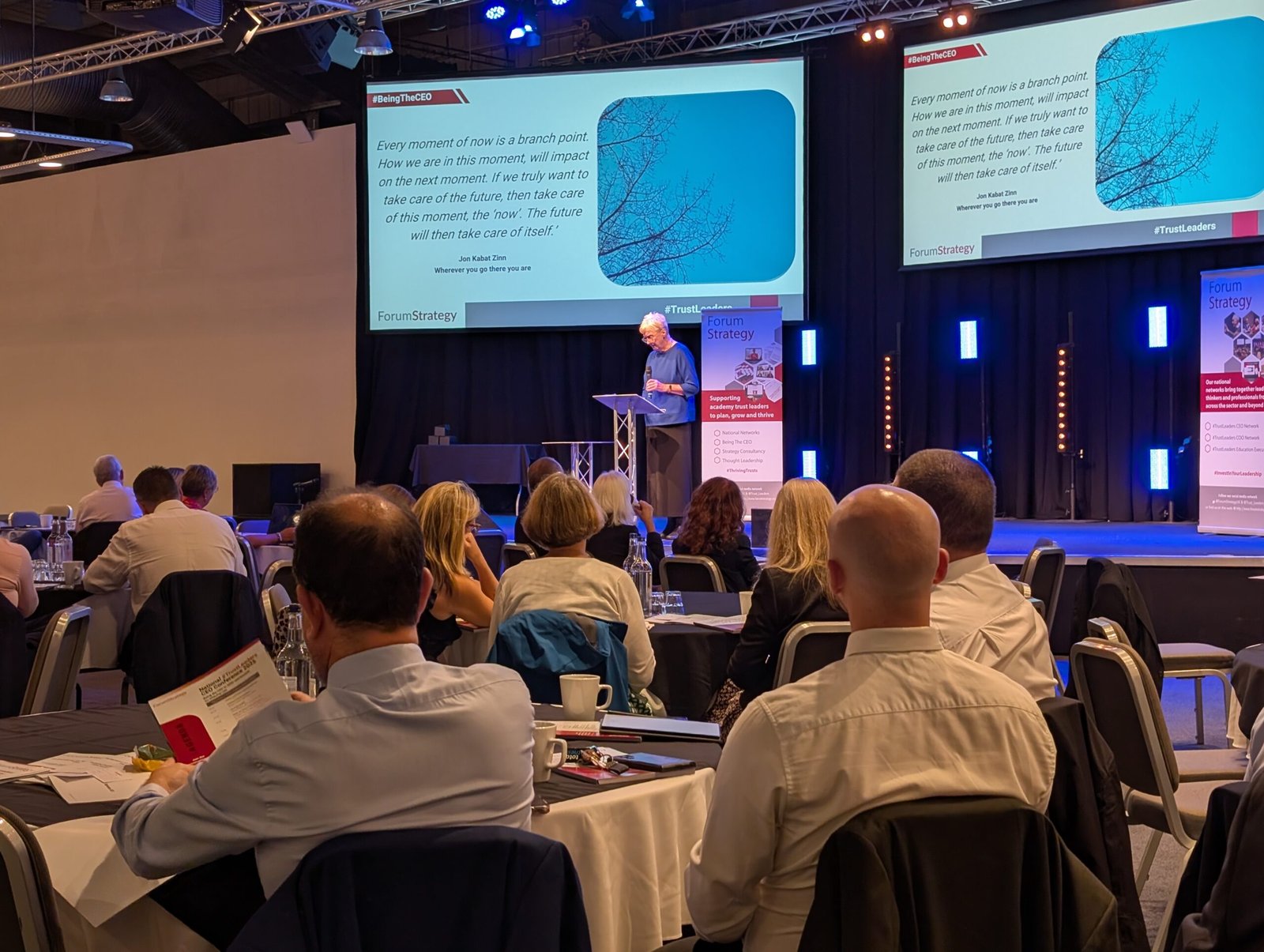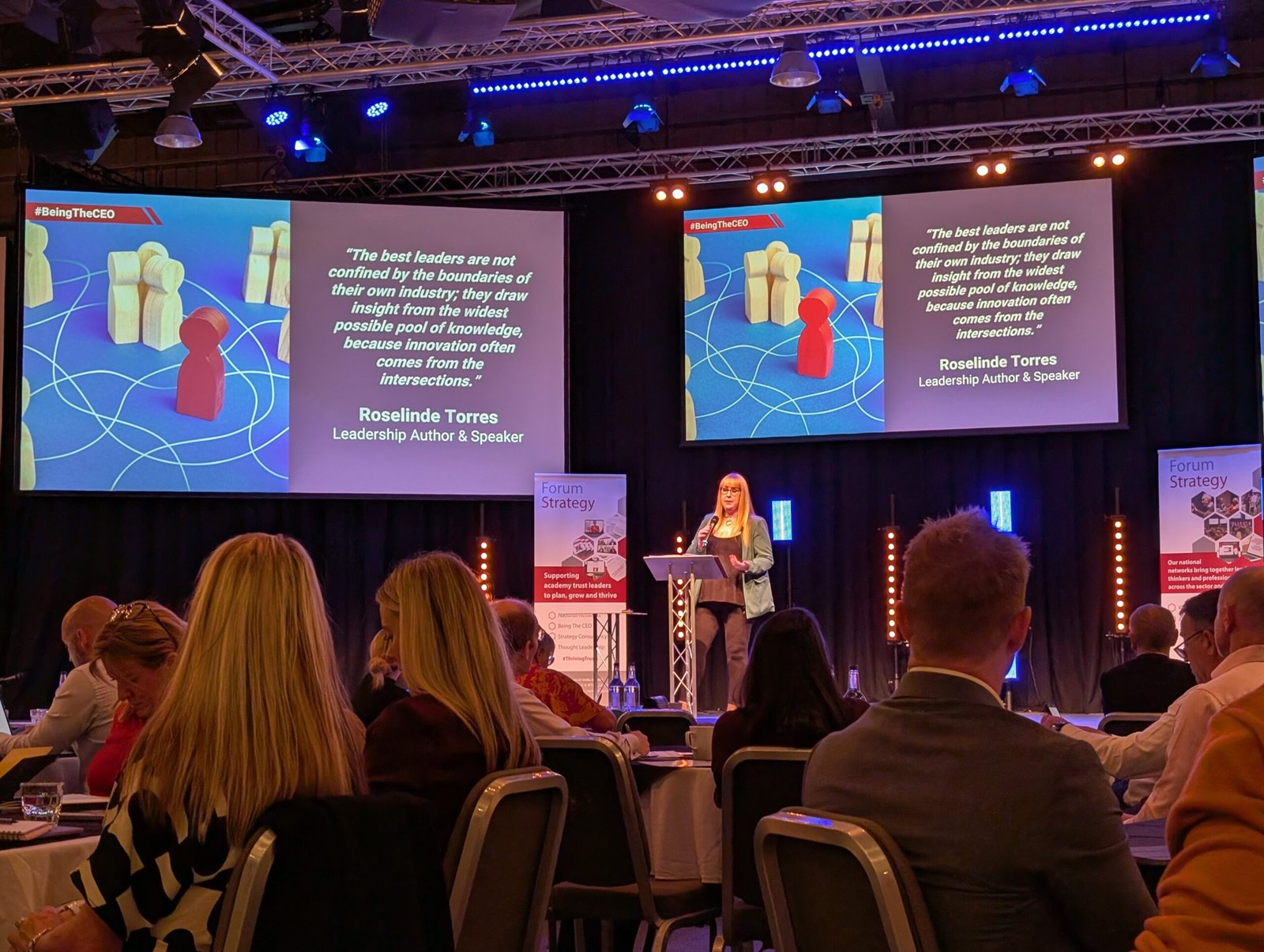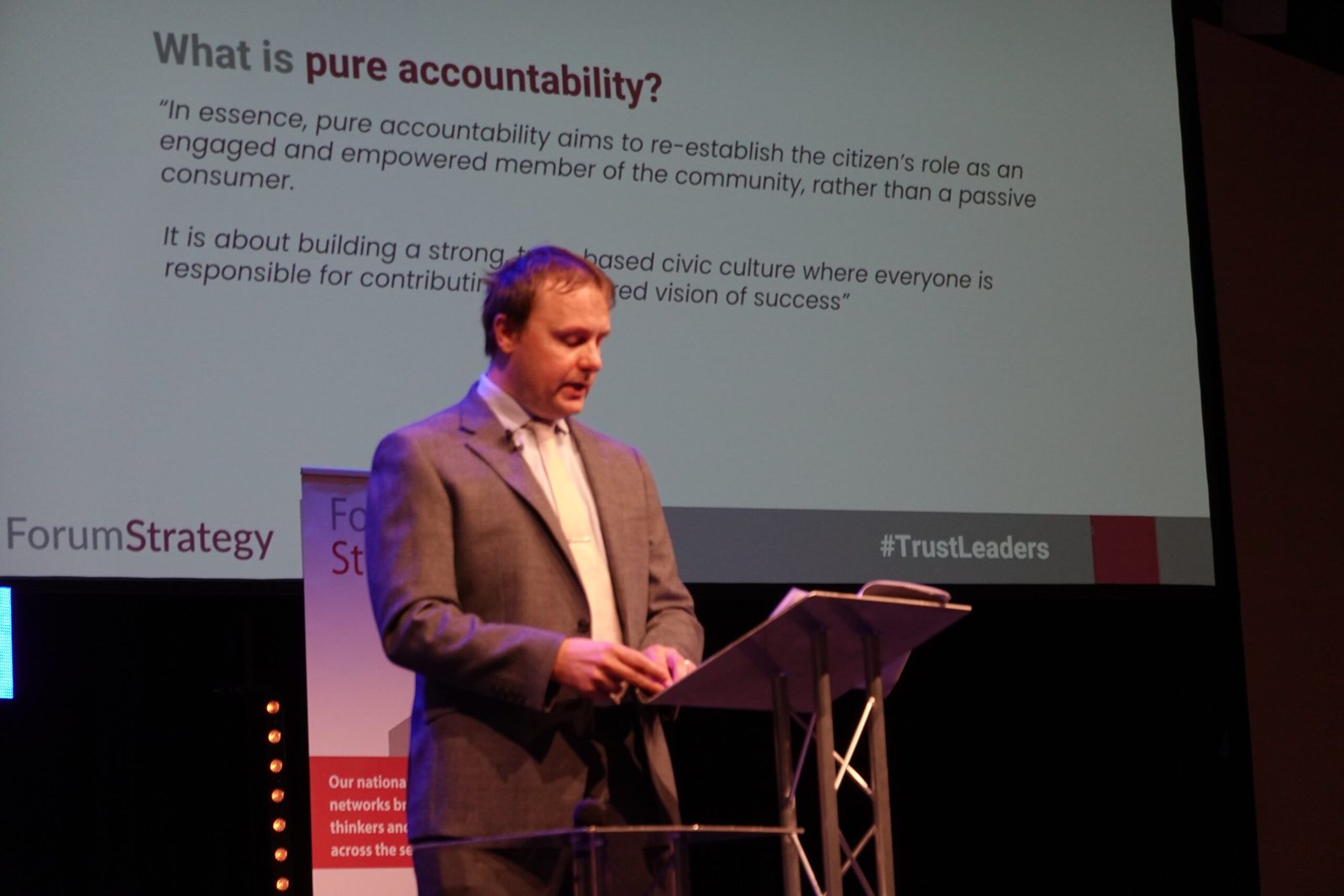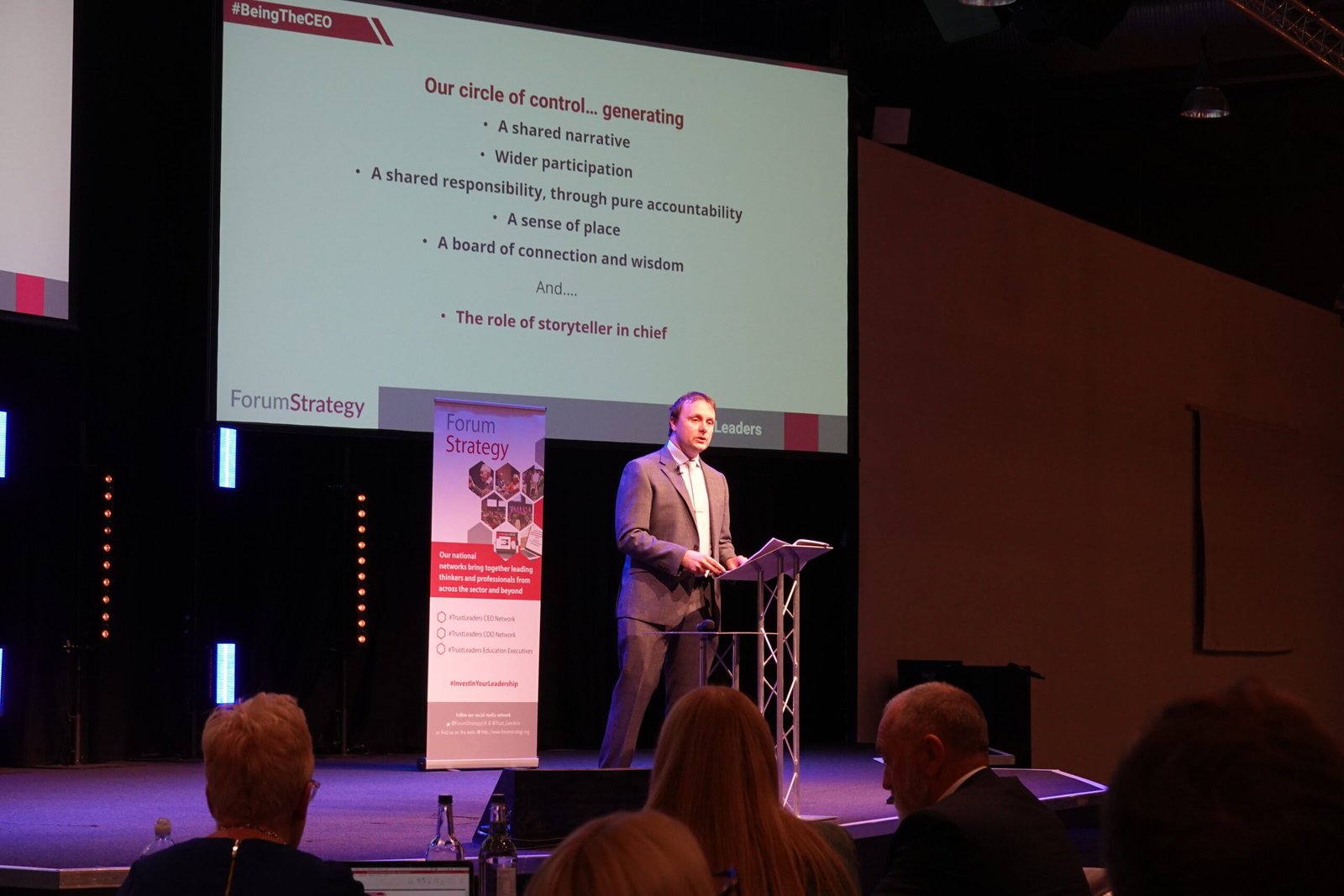Being the CEO in 2025 and beyond: An evolving role
In this article, Sarah Ginns shares some of the key learning points and ‘takeaways’ from our eighth annual National #TrustLeaders CEO Conference.
On Thursday 18 September 2025, Forum Strategy were delighted to again welcome so many members of our National #TrustLeaders CEO Network to our National #TrustLeaders Conference, held at Trent Vineyard in Nottingham.
The theme for the event was ‘Being the CEO in 2025 and beyond: an evolving role’, which, given another turbulent year for trust leaders and society as a whole, provided a timely opportunity for colleagues across our national #TrustLeaders CEO Network to pause, reflect and look forward with hope.
Maggie Farrar was once again our facilitator for the day and reminded us that the role of trust CEO is one that shapes the world, as well as being shaped by it – a poignant and apt message from Maggie to begin the day.

Opening keynote
Forum Strategy’s CEO, Alice Gregson, opened this year’s conference by emphasising the influence and impact trust CEOs have on shaping society – not only as leaders of their own organisations but also as leaders of people, leaders of communities, and leaders of systems. She expressed her hope and optimism for what lies ahead, because of the strong values and relentless commitment colleagues hold around the room, always striving to do their best for the young people, staff and communities they serve.
Alice reminded us that trust CEOs are part of a larger leadership eco-system from which we can draw significant amounts of learning and, into which we can also contribute our own learning. She emphasised that Forum Strategy (particularly the conferences) offer something special, because we recognise that education is not an island but is part of a much wider system of public services, and indeed, of society itself, and there is huge value in taking opportunities to bring these perspectives together so we can learn from and grow our collective leadership expertise.

“The best leaders are not confined by the boundaries of their own industry; they draw insight from the widest possible pool of knowledge, because innovation often comes from the intersections.” ~ Roselinde Torres (Leadership author and speaker)
Alice reflected that when the role of the academy trust CEO first began to emerge more than a decade ago, it was a long way from being defined; and that many colleagues attending the conference had been part of the journey to not only better define the role but in creating the legacy of a successful trust model. Indeed, over a decade on from when the first academy trusts were established, the CEO role has already evolved significantly. It is – at its best – about leading organisations that are employers of choice, that are the beating heart and enablers of their communities, that are innovators in pedagogy and technology, and that are critical partners in the wider system of public services. And looking ahead, she confirmed the role will evolve again.
Drawing on the leadership examples of Nelson Mandela, Steve Jobs, Malala Yousafzai, Greta Thunberg, and Dr. Jonas Salk; Alice illustrated how critical leadership is to our world; emphasising that it is too important to leave to chance or just hope that what worked yesterday, will still work tomorrow.
Reflecting on their ever-evolving role, Alice encouraged CEO colleagues to embrace what she termed ‘system stewardship’ – the ability to lead with an acute awareness that trusts and schools operate within interconnected systems, and that we must take responsibility for shaping and steering those systems in ways that create long-term value for both our organisation and for society. Alice’s belief is that the successful CEOs of the next decade will be those who:
- See themselves not just as organisational leaders, but as system leaders. Moving from organisation-centric leadership to system conscious leadership.
- Recognise the challenges we face cannot be (and should not be) solved by education alone – whether it’s growing levels of child poverty, decreasing levels of mental health, increasingly complex safeguarding issues, the growing complexity of special educational needs, workforce shortages, or the digital revolution – these are all issues that require system leadership if we are to address them sustainably.
- Understand that their influence extends beyond their trust and even beyond their sector, into the very fabric of society and they will be intentional in putting this influence to good effect.
- Will build and develop leaders of the future who understand and share in this commitment to system stewardship, ensuring this critical aspect of leadership is not reliant only upon one or two individuals or institutions.

Forum Strategy have been championing and working on this very concept of system leadership for some years; and specifically, on the growing importance of CEOs as system leaders. There are four in-depth thinkpieces that bring this work to life through specific ideas, examples of practice and practical recommendations that can help to build this in a tangible way. Alice highlighted Forum’s latest paper on system leadership – ‘The Power of Place’ – which has again been co-produced with a group of trust CEOs on our CEO as system leaders programme, and is focused on locality leadership, including an invaluable skills, behaviours and knowledge matrix.
Alice emphasised that whilst the concept of system leadership isn’t new, the ‘big idea’ being proposed is that system leadership should no longer be an optional part of the CEO role. The complexity of the challenges we face, the changing needs of children and young people, and the shifting expectations of our workforce mean that taking a system-level view is no
longer a “nice to have”; it is a requirement for successful leadership both now and in the future. Alice suggested that over the next decade, ‘being the CEO’ will require us to be employers of choice, innovators, champions of inclusion and belonging, and system leaders; and reminded us that great leaders honour the lessons of the past, act with clarity in the present, and they keep their vision fixed firmly on the future they seek to create.
“Great leaders honour the lessons of the past, act with clarity in the present, and they keep their vision fixed firmly on the future they seek to create.”
Community, community, community
Forum Strategy’s Founder and Chair, Michael Pain, followed Alice’s keynote address by emphasising the power and potential of community and of people; and that our survival and progress have always depended on our capacity to imagine, build, and sustain communities. He commented that in many ways we are living in incredible times with incredible opportunities; however, there remain enormous struggles which are not equally distributed.
Michael commented that whilst we have all the ingredients we need for health and prosperity – for fulfilling lives; what we are missing is the sense of togetherness, belonging and – for too many – the chance or confidence to participate in the unprecedented opportunities that exist. Diminishing participation, connection, togetherness, and sense of shared purpose or moral endeavour in communities, underpin so many of the issues we face not just as an education system, but as a nation. In addition, we have seen the roles and responsibilities of trusts and schools expand and grow in recent years, without any proper attempt to define a national vision or clear sense of purpose for education or communities.
This necessary underpinning of society as a shared and collective purpose is what Jonathan Sacks describes as a shared morality. He writes “Society is constituted by a shared morality… A free society is a moral achievement, and it is made by us and our habits of thought, speech and deed. Morality cannot be outsourced because it depends on each of us… when morality is outsourced to either the market or the state, society has no substance only systems.”

“Society is constituted by a shared morality… A free society is a moral achievement, and it is made by us and our habits of thought, speech and deed. Morality cannot be outsourced because it depends on each of us… when morality is outsourced to either the market or the state, society has no substance only systems.” ~ Jonathan Sacks
Michael suggested that many of the headwinds that our education system now faces, including a lack of readiness for school, absenteeism, childhood obesity, numerous special educational needs, poor behaviour, and disengagement of some parents in learning and technology regulation beyond the school gates, fundamentally comes down to an erosion of a shared sense of community endeavour and a shared sense of responsibility and of purpose.
For those leading institutions such as academy trusts and schools, Michael commented that the most profound and lasting solutions increasingly depend on community-centred leadership – solutions driven from the bottom up, from personal and collective responsibility. Communities, at their most thriving, are the social glue and the cornerstones of a culture that prizes and sustains learning, social capital and reciprocity, and health and wellbeing beyond the school gates.
Commenting on the CEO role, Michael urged colleagues to see themselves as encouragers, enablers and expectants of community and family responsibility and ownership; breaking the
cycle of dependency and apathy by equipping communities and families and holding them to account. The emphasis here being on pure accountability – accountability that is local, two-way, and formative – and which is a collective effort where trusts and schools commit to parents and communities, but parents and communities also commit to schools.
With this in mind, Michael asked colleagues to consider what key steps trusts and CEOs take and – going back to a theme from our Summer Symposium – consider what is within CEOs’ circle of control or influence. He suggested the following key areas:
- First, a shared story, sense of moral endeavour. The vision and narrative for trusts should speak directly to communities. A belief in the power of the collective to serve the next generation.
- Secondly, wider participation. Trusts and schools can better embrace volunteerism. This means giving local governing bodies a genuine and focused role in being the champions of communities. Trusting communities to help us address their issues and challenges, through partnering with them and enabling them to work better with us.
- Thirdly, a shared responsibility. Trusts should embrace what Michael termed as pure accountability back in 2020. This is giving the community – including parents and pupils – a genuine voice in the direction of the trust, and a means of informing, shaping and holding to account the collective vision and direction in a formative and none ‘high stakes’ way.
- Fourthly, a sense of place. Trusts should ensure their schools remain hubs of the community, not taking on all the roles and responsibilities, but providing spaces, places, and a means of connection.
- Fifthly, a board of wisdom and connection. Trusts should carefully consider how immersed the board is with the community.
- And finally, the storyteller. CEOs should be active and visible champions of their communities, celebrating success and achievements, highlighting the pressures and needs at a regional and national level, and forging impactful relationships with other local bodies in efforts to empower communities and families as partners.

In closing, Michael quoted Margaret J Wheatley’s “There is no power for change greater than community discovering what it cares about”; and suggested that probably the most important role for this generation of trust and school leaders is to reawaken and seek to help communities realise the old adage – that it takes a village to raise a child. Community-enabling leadership is now at a premium.
“There is no power for change greater than a community discovering what it cares about.” ~ Margaret J. Wheatley
National #TrustLeaders CEO Conference 2025
Videos and additonal resources are available on our dedicated conference page. Click the link below.

